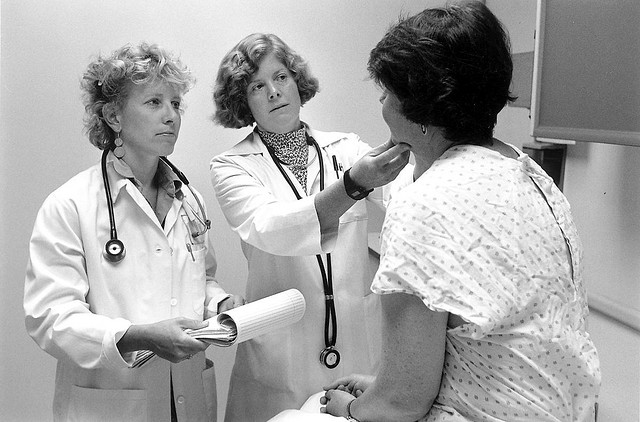The population is aging and demand for doctors is increasing. At the same time, doctors are less satisfied with their work so fewer people are interested in becoming doctors. We need innovative ways, like Stanford Hospital’s time in the bank program, to ease the load on physicians and encourage more people to join their ranks.
Research shows that doctors are more likely to experience burnout than other workers in the United States and more likely to be unhappy with work-life balance. Doctors typically work more hours a week than other professionals, and many are exhausted from their work. A recent survey of physicians from all specialties* shows that almost half of doctors, 45.8 percent, report at least one indication of burnout.
Physicians who practice emergency medicine, neurology, internal medicine, family medicine have the highest risk of burnout. Many of these practitioners suffer from heavy workloads and loss of autonomy. But of those, only neurologists were unsatisfied with work-life balance.
Physicians who practice dermatology, pathology, preventive medicine and general pediatrics have the lowest rates. Those doctors practicing general pediatrics, dermatology and preventive medicine also had the highest satisfaction levels with work-life balance.
At the same time that physicians are experiencing decreasing job satisfaction, demand for physicians is increasing. The affordable care act has led to a 2 percent increase in the demand for physicians. And, with the population is aging, demand for physicians is expected to grow by 17 percent by 2025.
The Association of American Medical Colleges projects a need for 12,500-31,100 more primary care doctors than we will have in 2025 and a need for between 28,200 and 64,700 more specialists.
*Survey data is based on responses from more than 7,000 doctors in all practice specialties.
Make sure you choose your doctors wisely. All doctors are not created equal, and you can now see data comparing surgeons.











The need is even greater for areas of poor population. This can affect all of us in multitude of ways.
Caring for people shouldn’t be synonymous with wealth and social status and that’s what being a doctor or nurse is today. My daughter wanted to be a nurse to HELP people, to really make a difference in people’s lives, but because of the competition to get a nursing spot, she decided against it. I also agree that becoming a doctor shouldn’t rule your life…there should be a limit to how many hours they have to work. They are people too, but being older I have seen the shift away from caring doctors to doctors who are snobs and total jerks to their patients because they, in my opinion, went into the field for the money.
It’s significant that you didn’t specifically mention the incredible shortage of fully trained American psychiatrists, especially child and adolescent psychiatrists. The field has become very unpopular with American medical school graduates due to the ‘carve out’ of mental health services by insurance companies and public pay alike, resulting in extremely low pay and incredible intrusion on the actual medical decisions (made by reviewers who have inadequate training-only a another psychiatrist is actually qualified to make those decisions) and the closing of residency training programs. Remember ‘Medical necessity’ is not the same as ‘Medi-Cal necessity’. That’s determined by what they can get away with.
Separating psychotherapy from medication management has been driven by demanding that cheaper clinicians be involved, but it puts psychiatrists in a very risky moral and medical legal position, guarantees redundant services, and it’s undermining our satisfaction with our work.
No wonder that a huge percentage of current practicing psychiatrists were born and trained outside of the US, but might not do well speaking English. It’s just going to get worse over time. The current public pay system has undermined US postgraduate psychiatry training due to inadequate reimbursement. Many psychiatric residency training programs have been closed over the past few decades due to lack of funding. This also contributes to fewer medical students choosing to go into psychiatry.
People in affluent communities often pay out of pocket for psychiatric expenses, while those with poor insurance, MediCare and MediCal have great difficulty finding a psychiatrist who can afford to see them. Our inadequate insurance system has created multi-tiered coverage, with many needful people getting inadequate or no services.
We seem to be heading toward a power grab by professional groups who aren’t fully trained to be psychiatrists, but who want to have the ‘prescribing power’ that medical doctors have.
I wouldn’t recommend this ‘solution’ to friends or family. We can hope that this grave situation will be addressed before it’s too late.